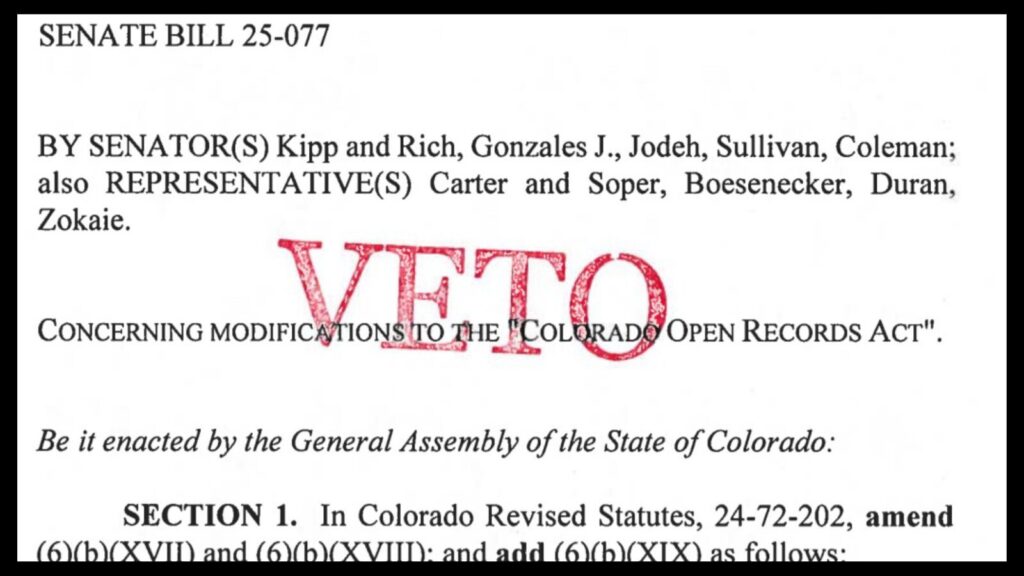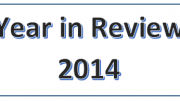By Jeffrey A. Roberts
CFOIC Executive Director
Gov. Jared Polis’ veto of a bill to extend Colorado Open Records Act response deadlines for requests made by the public and businesses will stand after legislators Friday abandoned their effort to override it.
“While we believe our bill is reasonable and fair to both records requesters and those who must fulfill records requests, we also acknowledge the concerns raised by the Governor, the press, and a coalition of groups who want to ensure their access to public records is not compromised,” the sponsors of Senate Bill 25-077 wrote in a statement.
The Senate voted to lay over the bill until May 9, which is after the legislative session ends.

The letter from Sens. Cathy Kipp, D-Fort Collins and Janice Rich, R-Grand Junction, and Reps. Michael Carter, D-Aurora, and Matt Soper, R-Delta, says they have asked for and received commitments from the governor’s office and a broad coalition of stakeholders and advocates “to continue conversations on this topic with a goal of finding solutions that are both transparent and fair to everyone.”
A successful override vote, which requires two-thirds support in each chamber, had seemed possible because the bill passed the Senate 27-6 and the House 45-19. But there was pressure on lawmakers to uphold the veto from various groups, including the Colorado Freedom of Information Coalition, the League of Women Voters of Colorado, the Independence Institute and Colorado Common Cause. Pressure also came from some journalists who were uncomfortable with the bill giving favorable status to a “newsperson” as defined by Colorado’s press shield law.
“I don’t want special, faster access,” 9NEWS anchor Kyle Clark said in an April 21 commentary on his Next program. “I want the public to see what its government is doing. Whether it is you or me asking for those records, we both have the same right to them. That’s why they’re called public records.”
Kipp had said that SB 25-077 was necessary because records custodians are “essentially drowning in CORA requests.”
“Over the past decade, the volume and complexity of records requests have grown dramatically,” the sponsors’ statement says. “In many cases, we have seen requests grow from a few dozen to several hundred each year. Governmental entities have the complex job of making records available in a timely manner while protecting the privacy of students and other members of the public whose data they may hold.”
“While the public has a right to public information,” the statement adds, “the cost of fulfilling these requests is rarely covered by the allowed fees. Subsidizing these requests diverts resources away from our core missions as public servants, like educating children and maintaining infrastructure.”
The measure would have given records custodians five working days, rather than three, to fulfill CORA requests made by the public and an additional 10 working days, rather than seven, if “extenuating circumstances” exist. The bill exempted journalists from the lengthened timelines, but governments could have taken up to 30 working days to fulfill requests made “for the direct solicitation of business for pecuniary gain” and charge a “reasonable cost” — rather than the maximum hourly rate in CORA — to do so.
CFOIC had asked Polis to veto the measure because it “creates additional unnecessary barriers for people seeking to gain a better understanding of state and local government activities in Colorado, which is the very purpose of CORA.”
“By extending CORA response times to three weeks if governments claim that ‘extenuating circumstances’ apply — which happens frequently — SB 25-077 essentially gives records custodians an excuse to further delay providing public records within a reasonable period of time,” CFOIC’s letter said. “We know from the freedom-of-information hotline we’ve run for the past 12 years that government entities often miss the statutory deadlines, and there’s not much that Coloradans can do about it.”
We also argued against imposing additional barriers on obtaining public records when requesters already face high fees in many instances. CORA’s maximum hourly research-and-retrieval rate rose 23 percent last July 1 to $41.37/hour (after an initial free hour). CFOIC has counted more than 1,500 cities, towns, counties, state agencies, special districts, school districts and public universities that have raised their rates since then.
“It would certainly be convenient for the Executive Branch to agree to weaken CORA, but as a representative for the people of Colorado, I support more, not less, openness and transparency,” Polis wrote in his April 17 veto statement.
The governor criticized the bill for creating “three classes of open records requests that are subject to different timelines: those made by mass media, those made for pecuniary gain, and all other requests.”
“Essentially, under this bill, speed to access public information is determined by who you are,” Polis wrote. “A newsperson, a member of the public, and a person seeking financial gain may all request the same information and, under this bill, get access to that information on different timelines. To ensure fairness and confidence in public transparency, all legitimate requests for public transparency under CORA should be treated equally under the law, without preference for some requestors over others.”
SB 25-077 contained some minor provisions that would have helped records requesters.
It required government entities to post on their websites rules and policies about how to make CORA requests as well as their records retention policies. The bill also required records custodians to provide requesters, if they asked, “a reasonable break-down of costs that comprises the fee charged for research and retrieval of public records.”
The bill additionally clarified that a government entity must allow electronic payments for public records if that government entity lets the public pay for services or products electronically. Some governments still require requesters to write paper checks for public records, interpreting a 2023 CORA amendment to mean that records custodians don’t have to accept credit cards if that designated person doesn’t take credit cards for other services or products.
Follow the Colorado Freedom of Information Coalition on X or BlueSky. Like CFOIC’s Facebook page. Do you appreciate the information and resources provided by CFOIC? Please consider making a tax-deductible donation.




